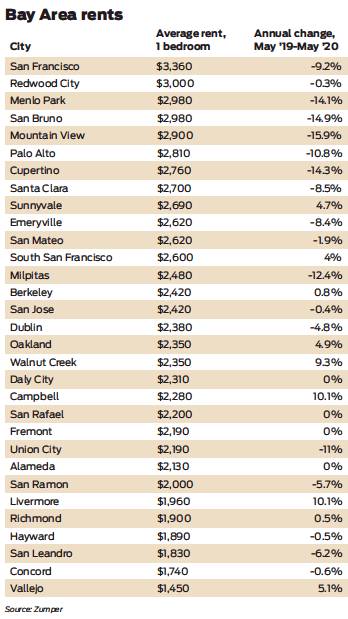Silicon Valley, S.F. rents plunge amid downturn
By J.K. DineenThe cost of renting an apartment in the Bay Area plummeted in May, as layoffs and the increased flexibility of working from home drove a double-digit drop in some of the nation’s most expensive housing markets.
Rents for a one-bedroom apartment dropped most in the cities richest in high-paying tech jobs, falling 9.4% in San Francisco compared with May of 2019. In Mountain View, home to Google, rents fell 15.9% year over year, while in Apple’s hometown of Cupertino rents dipped 14.3%, according to the rental search engine Zumper. In San Bruno, where YouTube has its offices, rents tumbled 14.9%.
“It’s a dramatic drop in San Francisco and the South Bay,” said Zumper CEO Anthemos Georgiades. “This is real. We have never seen anything like it.”
While rents are down across the country, the drop was more severe in highpriced coastal cities that over the past decade have been most attractive to tech entrepreneurs and their investors, Georgiades said. Several of the biggest employers in those cities, including Facebook and Google, are allowing employees to work from home through the end of the year, while San Francisco’s Twitter and Square have said many employees will be allowed to work remotely permanently.
This has employees rethinking all sorts of assumptions, including where they live. In a May survey of 2,800 tech workers in Northern California, New York City and Seattle, 66% said they would be willing to work remotely and relocate out of those urban areas. The survey, by the employee messaging app Blind, found that 20% of San Francisco respondents said they would be willing to accept a pay cut of up to 20% in exchange for being allowed to telecommute from a more affordable city.
That remote working trend is “compounding the job losses and putting significant downward pressure on rents” in the Bay Area, Georgiades said. “You have all these CEOs talking about how productive their teams are working from home and questioning whether they need to return to the office.”
The drops in rent were much less severe in Berkeley — less than 1% — while in Oakland rents are up 4.9% from May of 2019, mostly because that city has seen a big jump in rents in late 2019 and early 2020. Georgiades speculated that the East Bay may become even more attractive postcoronavirus among Silicon Valley employees who want to stay in the Bay Area but don’t feel the need to live close to their corporate campuses. And while rents have skyrocketed in Oakland, the average onebedroom in that city — $2,350 a month — is still a bargain compared to Menlo Park, where the average unit is $2,980, and Palo Alto, where the average is $2,810.
The 9.2% drop in the average one-bedroom San Francisco rent of $3,360 still leaves it unaffordable for the vast majority of city residents. But Georgiades said he could see that number falling below $3,000, similar to New York, where the average one-bedroom goes for about $2,900. He said rents would likely continue to decline through the end of the year. In addition to dropping rents, the large multifamily developers will likely continue to offer more free rent promotions. Some developers are now offering eight free weeks, compared to the four weeks they were giving prior to the pandemic.
“This definitely has a floor,” Georgiades said. “We are not predicting that rents will fall to $1,750. Unfortunately for renters, that is not going to happen.”
Neighborhoods that have a high percentage of college and graduate students could see the highest drops, as landlords rush to attract tenants to buildings that would typically be filled with students. UC Berkeley has yet to announce whether the fall semester will be remote or on campus.
“It’s very unclear if those leases are going to be signed right now,” he said. “There could be a lot of downward pressure in those ZIP codes.”
He expects landlords to be “pragmatic” in offering deals, lowering rents and making accommodations to existing tenants. “They know there is not a line around the corner of people looking to take their current tenant’s place,” he said.
Georgiades said there has long been an unsupported myth that Bay Area residents are leaving the city in droves because of high cost of living, steep taxes, snarled traffic and homeless issues. It was a narrative that was not supported by the facts, he said — until now.
“I’ve lived in the Bay Area for eight years and I’ve heard that story for eight years,” he said. “This is the first time ever the narrative is actually real.”
The phenomenon of a lot of San Francisco renters “turning in their keys and leaving the city” is something landlords are seeing, according to Charley Goss of the San Francisco Apartment Association.
“Lots of renters who maybe don’t have roots here, or who don’t need to be here for work, or who are frustrated with the city street conditions, are leaving,” he said. “This, combined with some tenants being unable to pay, would lead some owners to rush to fill vacancies as quickly as they can.”
In addition a lot of Airbnb listings are being offered as regular apartments now, which could also increase supply and lower rents, Goss said.
J.K. Dineen is a San Francisco Chronicle staff writer. Email: jdineen@sfchronicle.com Twitter: @sfjkdineen
